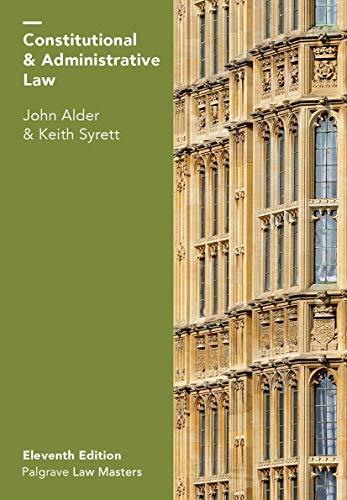Question
Danijela, a Slovenian national, was offered a part-time job as a babysitter in Italy in December last year. On the day she is travelling to
Danijela, a Slovenian national, was offered a part-time job as a babysitter in Italy in December last year. On the day she is travelling to Italy, she is randomly stopped at the border by two officials, who ask for her documents and the reasons why she wants to move to Italy. To her amazement, they refuse her entry into Italy claiming that i) she is not a proper migrant worker since she only has a part-time job in Italy, and ii) that she would not be entitled to work as a babysitter anyway, following Art 45(4) TFEU.
Advise Danijela whether EU law gives her the right to enter Italy and work, despite the decision of the Italian border officials.
Assume that Danijela is eventually allowed into Italy. Danijela returns to her home in Slovenia at weekends. She shares her home with her female registered partner, Gauri, and Gauri's son, Luke, aged 10. Gauri is a Canadian national and holds a visa allowing her to live permanently in Slovenia. Luke has joint Slovenian and Canadian citizenship, since his father was Slovenian and Luke has always lived in Slovenia.
Soon all the family decides that they wish to relocate and Danijela finds a flat in Italy. On the day Gauri and Luke are moving to Italy, they are stopped at the border. Luke and Gauri are told that Luke is only allowed to stay in Italy for three months, while Gauri cannot move to or work in Italy.
Advise Gauri and Luke whether EU law confers on them any rights to relocate to Italy and, in the case of Gauri, also work in Italy.
Danijela would now like to qualify as a professional childminder. She has decided to attend a vocational training course organised by the City Council of Trieste. The course costs 600 euros for Italian citizens but she is told by the Council that she will have to pay 1,000 euros.
Advise Danijela on whether, based on EU law, she will have to pay the extra fees.
While still working as a babysitter, Danijela has also started a small business in Italy. She buys pumpkin seed oil from Slovenia and imports it to Italy. Danijela is surprised to find out that a significant tax is applied to imported pumpkin seed oil. This is due to a policy of the Italian government, aimed at increasing the consumption of sunflower seed oil for its health benefits, that applies a low tax to sunflower seed oil. Italy also has a limited internal production of pumpkin seed oil, to which the same low tax as the one applied to sunflower seed oil applies.
Advise Danijela whether the tax on imported pumpkin seed oil complies or not with EU law and why.
Step by Step Solution
There are 3 Steps involved in it
Step: 1

Get Instant Access to Expert-Tailored Solutions
See step-by-step solutions with expert insights and AI powered tools for academic success
Step: 2

Step: 3

Ace Your Homework with AI
Get the answers you need in no time with our AI-driven, step-by-step assistance
Get Started


